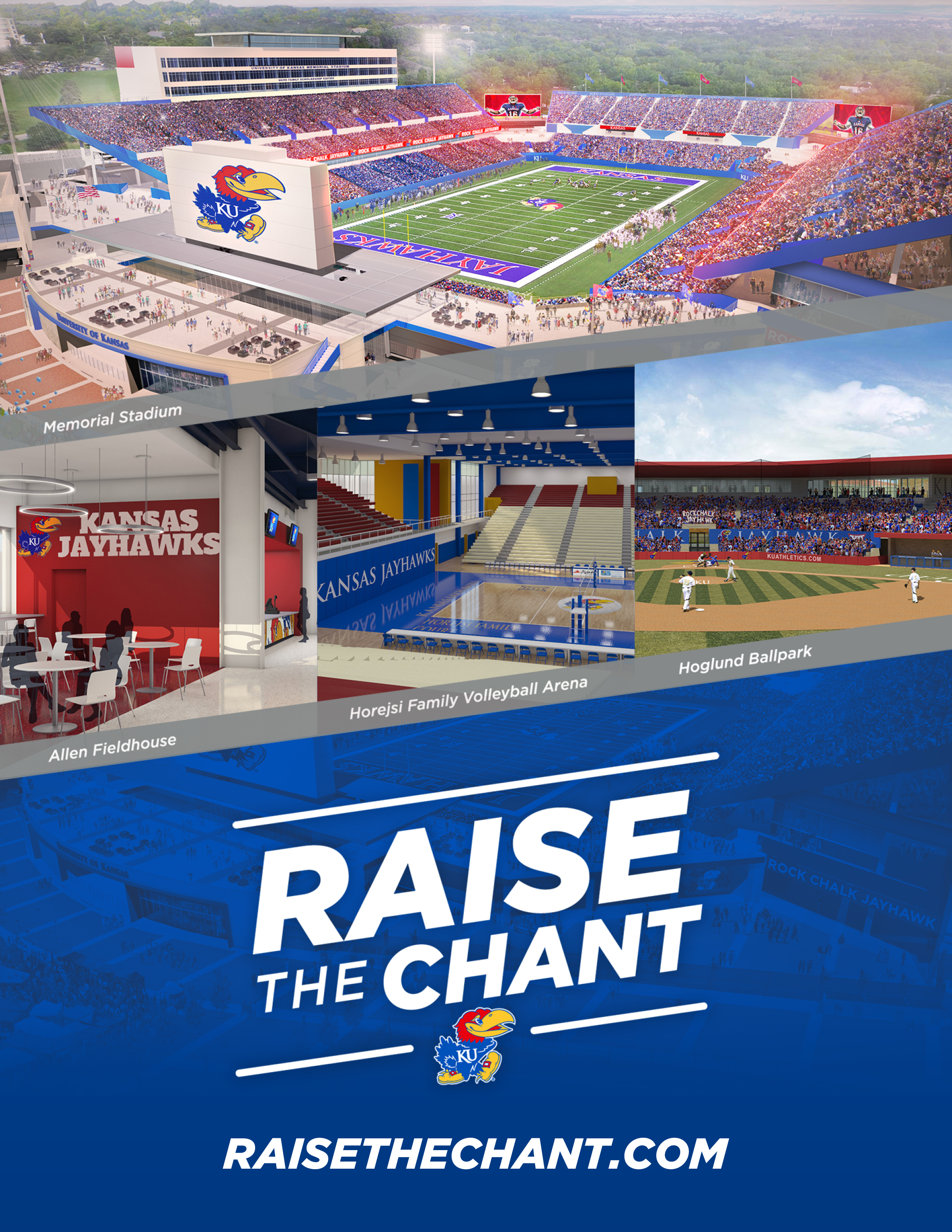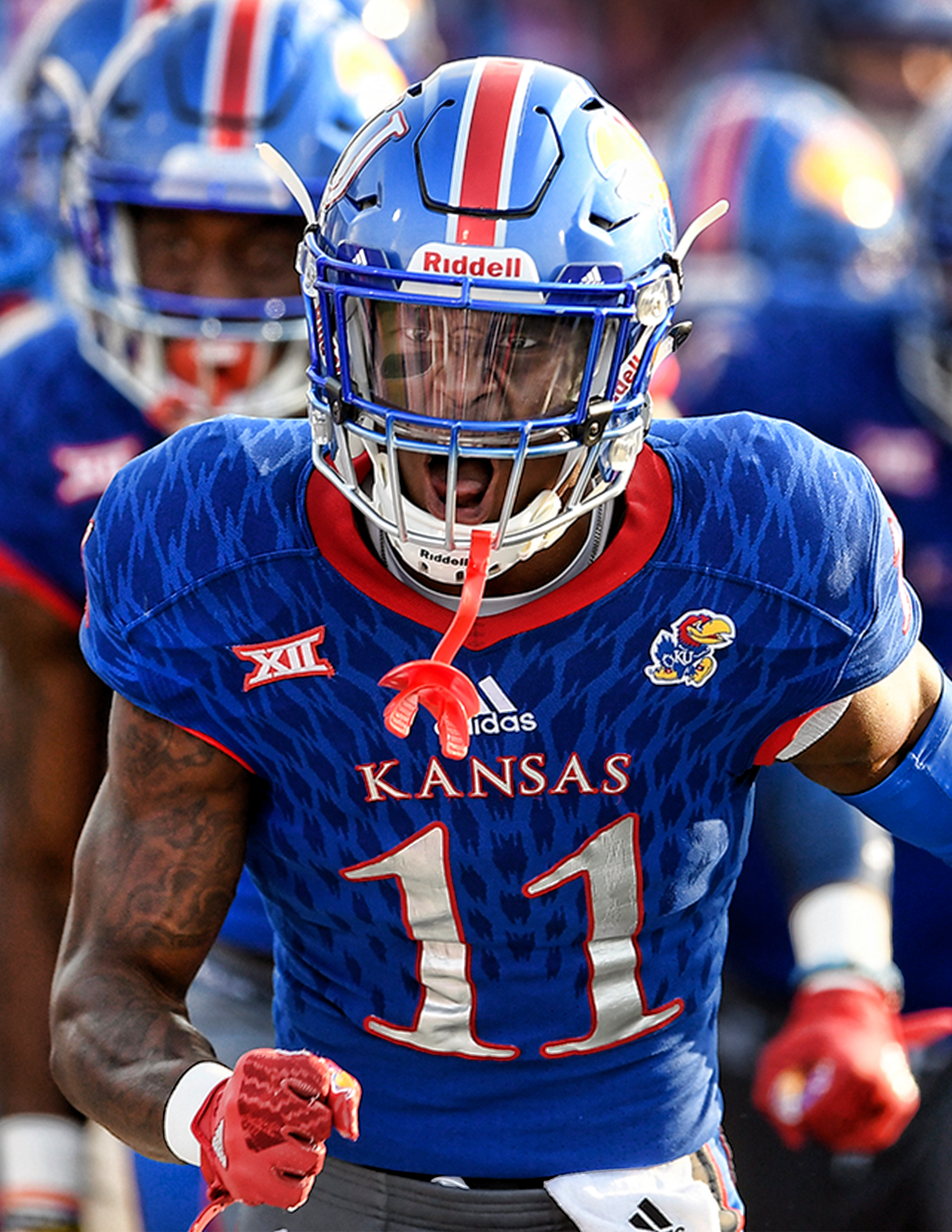RCW: Shoulder Pads and a Helmet
To the naked eye, Kansas safety Mike Lee is known for his electric, highlight-reel plays and bone-crushing hits. However, the power behind his debilitating hits goes much deeper than simply trying to record a tackle on the stat sheet. It goes back to a childhood surrounded by murder and violence. It goes back to a home that was destroyed by Hurricane Katrina. It goes back to a boy from New Orleans’ 3rd Ward with nothing but shoulder pads and a helmet.
From an early age, it became clear to Lee that life in New Orleans could be troublesome. Yet, with his mother and sister living in New Orleans’ 9th Ward, brother in the 7th Ward and father from the 6th Ward, staying in New Orleans was never really an option, it was simply something you did, regardless of the difficulties.
“It was dangerous, I want to say,” Lee said of his childhood. “There was a lot of killing going on. It didn’t matter if you were famous or anything, people could still want to kill you.”
The violent surroundings made it clear to Lee that he would do anything to avoid that lifestyle. So the game of football was introduced to him as a way to stay occupied and out of trouble.
“My focus was on not getting into a gang or the drug-dealing business,” described Lee. “I really didn’t want to play football, but then my grandma made me. She put some shoulder pads and a helmet on me and said, ‘There you go.'”
Football came second nature to Lee, as he quickly took on the role of utility man; he bounced around from running back to cornerback to quarterback and even played a game at center.
As he continued to age, Lee picked up baseball, track and basketball, but there was nothing better than football. As a multi-sport weapon, Lee’s personal and athletic growth were excelling exponentially, and his attempt at staying away from violence was going as planned. His life was right where he wanted it. Then, in the blink of an eye, his life both on and off the field came crashing down.
Not by violence, not by injury; by a hurricane.
On August 24, 2005, Hurricane Katrina started its sweep along the Gulf of Mexico. It was a day before Lee’s ninth birthday.
“That was a bad birthday present,” recalled Lee.
With their home, school and possessions ruined in the following days, the Lee family headed to the Superdome with hardly anything to their name. For the aspiring football player in Lee, he had envisioned his first steps on the field of the Superdome to be when he was older and suited up in a uniform; not like this.
“Everything was destroyed,” said Lee. “All we had were three bags of clothes between me, my brother and my sister.”

The Category 5 hurricane forced Lee to call the Superdome his home for the course of two months, as he and his family lived off bagged food and slept on the floor. After the two-month stint, Superdome officials started directing people out of the stadium. Lee’s mother, Calandra, decided to move the family from New Orleans to Dallas in an attempt to get a fresh start. Upon arrival, only one thing was on Lee’s mind: football.
“When we got to Dallas, all I was thinking about was how I was going to play football,” remembered Lee. “I told my mom to go find me a football team, and she said, ‘All right.’ It didn’t even take her two hours, she came back after about an hour and 25 minutes and said she found me a football team.”
Following the uplifting news that he had a team to play for, Lee realized he had no equipment, cleats, ball; nothing. His mother quickly whipped up what she could, suiting up her son in only shoulder pads and a helmet, just as Lee’s grandmother did a few years prior.
“‘Mom, where are my cleats?'” Lee remembers asking. “She said she would get me some but they (his new team) would probably have some. So I went to practice in normal shoes, and all the players were looking at me like, ‘Who is this kid?'”
Joining a new team can be difficult for any athlete. For the shy kid from New Orleans in Lee, he opted to let his game do the talking.
“I was a quiet kid, so when I got there, I just wanted to go out there and start hitting people,” said Lee.
And that is exactly what he did.
Lee helped lead the Southside Rams to a league championship during his first year on the team. At the conclusion of the season, Lee’s family was set to return to New Orleans, although Lee himself was not entirely ready. His talent on the field resulted in his coach begging for him to stay in Dallas and remain a focal point of the Rams’ defense. The plea efforts were tempting, according to Lee, but he knew he had to return home.
Despite a reluctant decision to leave Dallas, Lee’s fortunes flipped as he connected with a familiar face upon his return to New Orleans, sparking the first taste of recruitment Lee received.
“When I got back home, I found my coach who I had played for when I was a kid,” said Lee. “That was exciting because I didn’t know he would be back in New Orleans. So for me to see him made me happy because I thought he wasn’t going to come back.”
Lee decided to join his old coach, Coach Dre, and play for the Eastern Rhinos. The Rhinos are a team that is a part of what is known as “Park Ball” to the New Orleans community. Park Ball is a competitive, pre-high-school league that allows high school coaches to look at players and try to recruit them. The combination of Lee’s explosiveness and elusiveness made him a highly sought after prospect, but he ultimately committed to L.B. Landry to play out his high school years.
At the start of his ninth grade year, news came out that L.B. Landry was merging schools – and athletic programs – with its rival school, Oliver Perry Walker. Pre-merger, both schools had strong football teams. So Lee knew two things once the merger took place: he would have to prove himself, and they were going to have an incredible football team.
“My first game… oh man,” Lee reminisced, with a smile. “I made a big play on (the) kickoff, where I hit a player so hard that he did a full flip in the air. I was like, ‘I like this, I’m going to keep doing this.'”
Lee continued to grow throughout his high school career, resulting in a scholarship offer from Texas Tech during his sophomore year.
“Texas Tech, who is this?” Lee remembered thinking. “I didn’t really pay attention to college football, I just played football because I wanted to play football.”

After being contacted by Texas Tech, Lee erupted on the field. By the end of his junior year, Lee was a three-time all-district honoree at safety and had helped lead the Landry-Walker Charging Buccaneers to the Louisiana Class 5A state semifinals all three years. His determination on the field was matched in the classroom, as he achieved a goal that he set out for himself his freshman year by completing his high school credits by his junior year, making himself eligible to leave for college one year early.
With offers from Arizona State, Georgia, Texas A&M, West Virginia and more on the table, Lee was contacted by a coach at Kansas; a coach who he had actually played against in his freshman and sophomore seasons.
“I first remember seeing that Coach got a job at KU on Twitter, and I was excited,” said Lee.
The coach he was referring to was Tony Hull, current associate head coach and running backs coach for the Jayhawks and former head coach of Warren Easton High School, a team that gave Landry-Walker difficulties. Lee noted that Hull’s team had won the final meeting between the two current Jayhawks in a game that Lee did not want to surrender.
Despite the Warren Easton victory, Hull distinctively remembered Lee’s talents causing mayhem for his team’s offense.
“He played with a vengeance,” recalled Hull. “He hit people with an attitude and he worked really hard. The school he went to was a school we played every year, and he gave our team problems every year.”
Once Hull arrived in Lawrence in 2015, he was excited to see Lee’s name was already on the Jayhawks’ recruiting radar. He contacted Lee and invited him out to Lawrence for a visit, where he quickly realized that Kansas might be a perfect fit for Lee, and vice versa.
The two New Orleans natives bonded during the short visit, which ended with a scholarship offer on the table. While Lee was mulling over his offers, he kept returning to Hull, as the two had already developed a deep trust and respect that Lee had not felt with any other coach.
“The other visits I went to, they told me I was going to start and do this and that, but I knew they were telling everyone that,” said Lee. “I didn’t want to fall in that hole. Coach Hull just kept it real with me. He wasn’t telling me what I wanted to hear, he was honest.”
After all of the visits, phone calls and offers, Lee decided his way out of New Orleans would come by way of the Kansas Jayhawks.
To Lee, he finally had accomplished what he had set out to do long ago: get out of New Orleans. In Hull’s perspective, Kansas was the best possible solution.
“We love (New Orleans) and it has a lot of great attributes about it,” said Hull. “However, one of the negatives about it is the crime that is there. Growing up there and dealing with those things, you know that you have to get out of there some sort of way. Coming to KU and playing football was Mike’s opportunity to get out.”
The introvert in Lee immediately enjoyed the calm nature of Lawrence compared to the hectic setting of New Orleans. The environment, community, even the landscape; Lee loved it all. There were a myriad of differences between Lawrence and New Orleans, and although he made sure to soak it all in, he knew that the only setting that truly mattered to him was on the gridiron.

Entering his first fall camp in August 2016 at fourth-string safety on the depth chart, Lee was motivated to make a name for himself. Just a few days into practice, he found himself getting reps with the second-string team. Once the 2016 season rolled around, his number wasn’t called much until a week-three game in the torrid Memphis heat. He made the most of his time on the field, recording four tackles. The following week, the Jayhawks were on the road against Texas Tech, the team who offered Lee his first scholarship, to kick off conference play. Lee’s initial thought process was that he wouldn’t see much playing time once Big 12 play arrived, but he quickly was proven wrong.
“My focus was just on watching the game and seeing how everything played out,” explained Lee. “Then I heard my name get called, and I got a little nervous, but I wasn’t going to show it.”
The freshman from New Orleans trotted out onto the field amidst a sea of nerves, goosebumps and jeers from the Lubbock faithful. He put all that aside and quickly showed the world who he was on a running back screen from the Red Raider offense.
“He (the running back) made a guy miss, and I was already running to the ball, so I knew this was my chance,” described Lee. “I hit him so hard and we (teammates) went crazy. I felt like I was back in high school. So I decided to just start hitting people.”
What ensued was an abundance of bulldozing hits and clutch pass-breakups that flooded Lee’s highlight reel with jaw-dropping plays. His freshman season was headlined by 12-tackle performances in consecutive weeks against Iowa State and Texas, two forced fumbles and a table-turning overtime interception against Texas, which led to a Jayhawk field goal, and victory, on the next possession.
This season, as one of the only returning starters in the Jayhawk secondary, the quiet kid from New Orleans has taken on a new role: leader.
“We’ve got a young secondary, so we’ve got to work on communicating more,” said Lee. “And I’ve got to be a big role in that.”
Although Hull is the running backs coach, he has already seen that change in Lee.
“He communicates a whole lot better now,” added Hull. “In high school, Mike was an introvert. He didn’t speak a whole lot, he didn’t communicate with individuals on a regular basis. But that has completely changed now. He communicates more, he’s open to more people, he talks to people he doesn’t know and he articulates his thoughts well. He’s just opened up a lot more.”
Even with Lee’s new fulfilling life in Kansas, he will always carry New Orleans with him. It has made him who he is. In Hull’s eyes, Kansas is the perfect piece of the puzzle in Lee’s life at this point in time.
“I think KU will allow him to reach his max potential because of the nurturing environment he’s in now,” explained Hull. “I think the sky’s the limit. I think KU provides an opportunity for him to reach those limits and maximize his potential.”
Lee’s journey all started with shoulder pads and a helmet. Now, when Lee puts on his shoulder pads and helmet, they symbolize much more than just padding. They symbolize a life rebuilt after a hurricane. They symbolize a life in New Orleans away from crime and violence.
They symbolize Mike Lee, sophomore safety for the University of Kansas.

